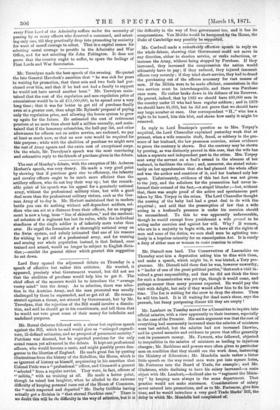In reply to Lord Stanhope's question as to Mrs. Torpey's-
acquittal, the Lord Chancellor explained yesterday week that at present, when a wife commits theft, fraud, or robbery in the pre- sence of her husband, the law presumes coercion, unless evidence- to prove the contrary is shown. But the contrary may be shoWn by proving, as was distinctly proved in this case, that the wife has. taken a separate and independent part in the crime. Mrs. Torpey sent away the servant on a fool's errand in the absence of her- husband, to facilitate the crime ; and, moreover, she stated volun- tarily on her apprehension that she had planned the whole affair- and was the author and contriver of it, and her husband only her agent. Unfortunately, evidence of this last fact was not given to the jury, and the solicitors for the prosecution had never in- formed their counsel of the fact,—a stupid blunder ;—but, without that, there was ample proof of the active and spontaneous part taken by Mrs. Torpey in the crime. The Lord Chancellor thought the nursing of the baby had had a great deal to do with the- acquittal ; and said that the presumption of law that a wife- acting in a husband's presence is under his coercion should be reconsidered. To this he was apparently unfavourable,. though he would exempt from punishment a wife proved to be- acting under coercion and against her will. Why? If women,. who are in a majority to begin with, are to have all the rights of men and none of the duties, we men shall soon be agitating use- lessly in a hopeless minority for an emancipation Act. It is surely a duty of either man or woman to resist coercion to crime.


































 Previous page
Previous page